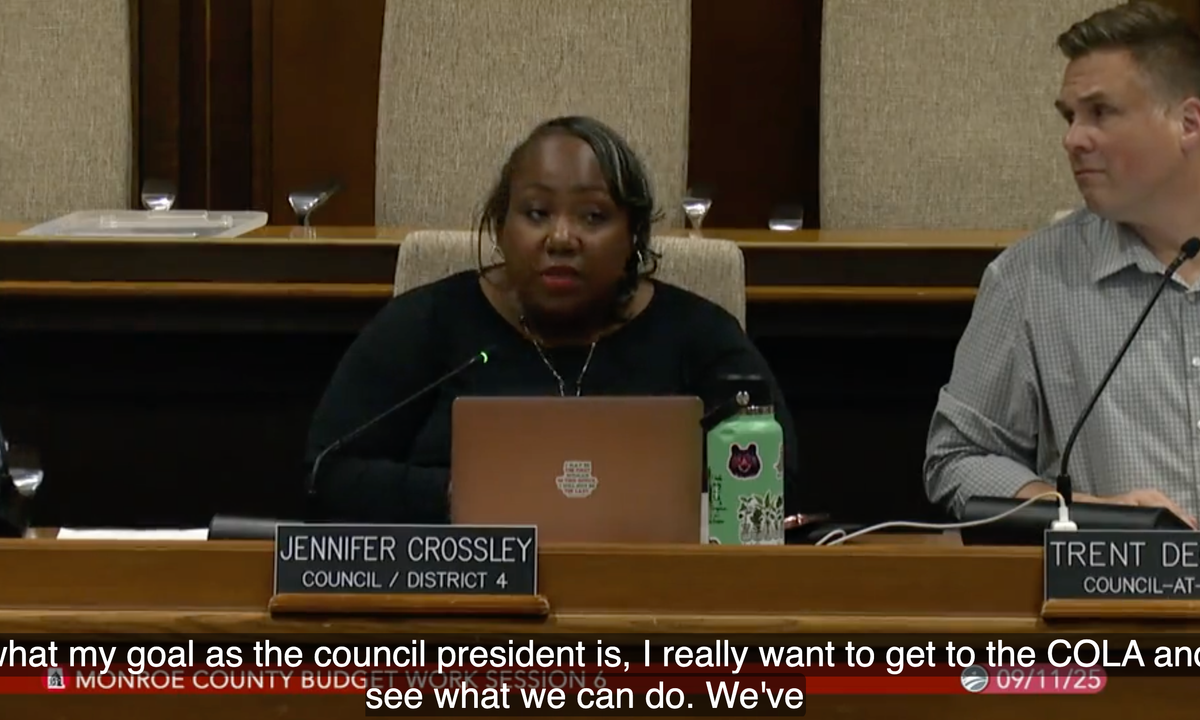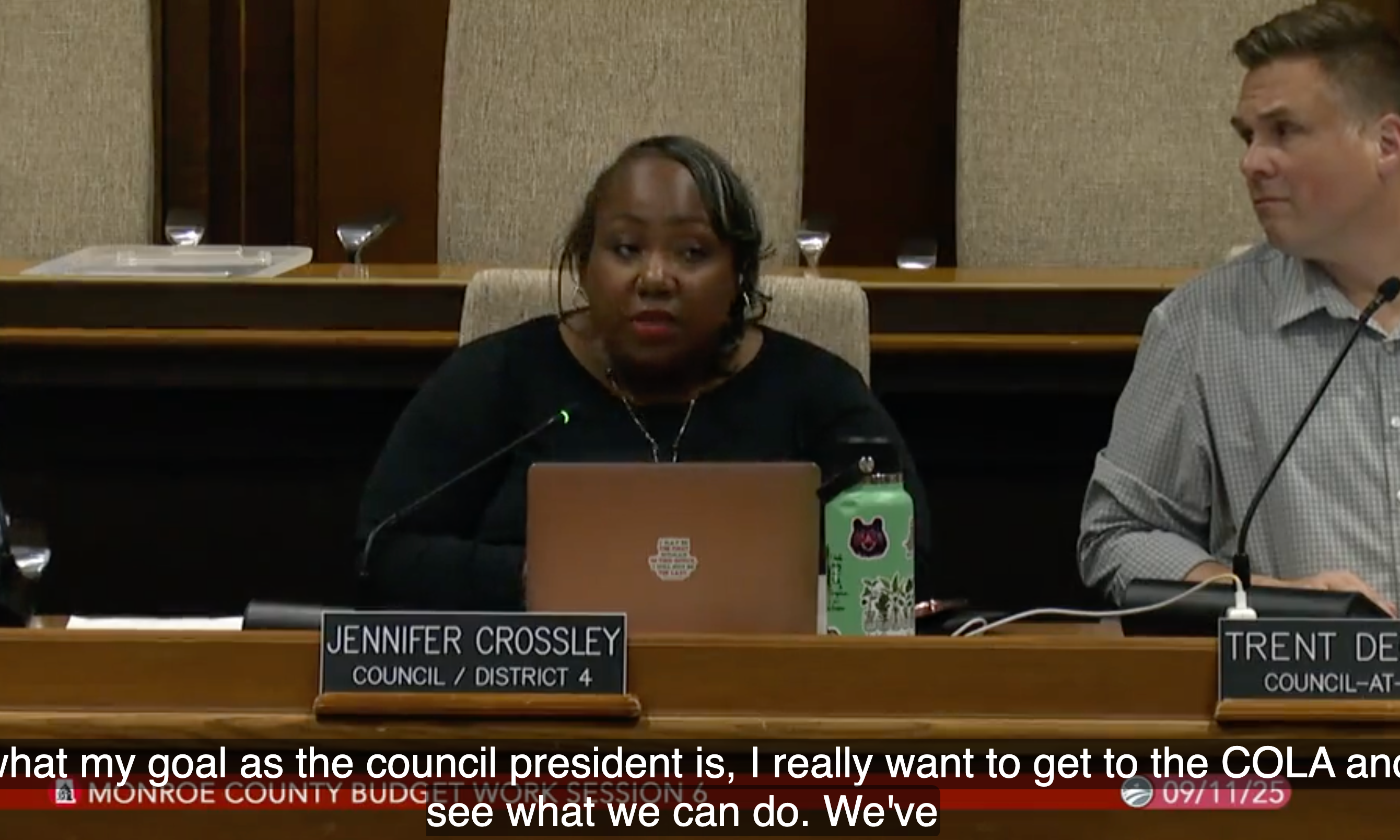Preview: Monroe County council to tackle $8M deficit in draft 2026 budget at Tuesday meeting
The Monroe County Council wrapped up its final budget hearing last Thursday night. But the draft 2026 budget still shows $135.7 million in expenditures with just $127.7 in revenues, for a deficit of $8 million. The $8-million shortfall is set to get some attention at Tuesday's regular meeting.


The Monroe County Council wrapped up its sixth and final departmental budget hearing last Thursday night and made several cuts along the way. But the county government’s draft 2026 budget still shows $135.7 million in expenditures with just $127.7 in revenues, for a deficit of about $8 million.
Council members wrapped up last Thursday evening scrutinizing a couple of individual line items, but started to turn their attention to general tactics for closing the gap before the final budget adoption.
The $8-million shortfall is set to get some attention at the end of the council’s regular meeting agenda on Tuesday (Sept. 16).
Preliminary numbers have to be sent to DLGF (Department of Local Government Finance) by Wednesday (Sept. 17). The public hearing on the 2026 budget is set for Sept. 30, with a vote to adopt it scheduled for Oct. 14.
Council president Jennifer Crossley told The B Square that it’s “very fair to say that there will be changes to budgets” at this Tuesday’s meeting.
Among the major categories that were identified as ways to reduce the deficit were capital expenses—there’s $4.3 million in capital lines across all funds. One tactic to be considered is moving some of those expenses into the outstanding balances for existing general obligations, or into the planned expenditures for upcoming general obligation (GO) bonds. County commissioners have approved GO bonds for $6 million this year, a doubling from the typical amount. But the county council will not necessarily approve that sum.
Training and travel is another general category, with a current total of $511,751 budgeted for 2026. Nearly every department has such a line item.
Postage, with $193,756 currently budgeted in 2026, is another category that cuts across most departments. The idea is for councilors to take a closer look at actual usage versus budgeted amounts.
For the 2026 budget, overtime across all departments is budgeted at $488,741. But councilors recognize that there’s a difference between essential overtime (such as for first responders) and overtime in other departments.
Office supplies total $189,245 across all departments. Some councilors want more detail on what’s included in what has been described as a “catch-all” category.
The total budgeted for the county’s self-funded health plan is another big-ticket item, but that, like the 3% working figure for the COLA (cost of living adjustment), is not something councilors seem eager to tinker with.
The council is looking to preserve the 3% COLA. Crossley put it like this last Thursday: “I really want to get to the COLA and see what we can do.” She added, “That is a big thing for me.”
The one individual department that seems like it could see some separate scrutiny on Tuesday is the health department. One of the council liaisons to the health department, Peter Iversen, said last Thursday, “One of the areas where there is a potentially significant reduction is in the health department,” saying that he thinks there’s at least one significant change that could be made.
Already on Thursday night, the council opened up its own office budget which was the fifth night of hearings, as a way of setting the tone for Tuesday.
Two line items got revised on Thursday—the Sophia Travis social services grant fund, from $250,000 down to $190,000, and the county’s support for the Bloomington Economic Development Corporation (BEDC), from $35,750 down to $15,000.
It was Trent Deckard who offered an amendment last Thursday to cover changes to both funds, both in one motion. But the question was eventually divided for separate votes, because councilors had different views on reducing each of the funds.
The Sophia Travis fund had been proposed to be increased from $174,000 in 2025 to $250,000 in 2026, based on the increased need for social services. The reduced figure of $190,000 was still above the 4% maximum levy growth quotient (which would have worked out to $181,000 in round numbers), against which the council has tried to benchmark the growth in the social services grant fund.
Deckard said the reduction would still be more than the 4%, but also would “keep us within reasonable striking distance of maintaining the budget controls that we’re really asking everybody to do.”
Councilor David Henry expressed some reservations about prioritizing the Sophia Travis line item at this point in the process, saying, “I guess I would prefer to revisit this later as we work through the entire budget.” Henry said, “I will continue to aim for [$250,000] if it takes three years to get there.”
The amendment to set the Sophia Travis grant fund at $190,000 passed on a 4-2 vote. Joining Henry in dissent was Kate Wiltz. Marty Hawk did not attend Thursday’s meeting.
For the BEDC line item, the $15,000 would allow the county government to maintain its membership in the BEDC, Deckard said, and to support the BEDC’s mission, which Deckard called “extremely vital to the community.”
Henry got confirmation from Wiltz that her intent behind including the BEDC in a $40,000 annual pass-through arrangement in the recently approved Simtra BioPharma tax abatement was to put the county government in a position to reduce support in its own budget for the BEDC, in case that were necessary. Wiltz noted that support for the BEDC had been a bit controversial in the past. Councilor Liz Feitl expressed concern that for 2026, the tax abatement will not have started yet, which would leave the BEDC short in the coming year.
The vote to set the BEDC line at $15,000 also passed 4-2, with dissent from Feitl and Wiltz.
The council’s Tuesday meeting starts at 5 p.m.




Comments ()